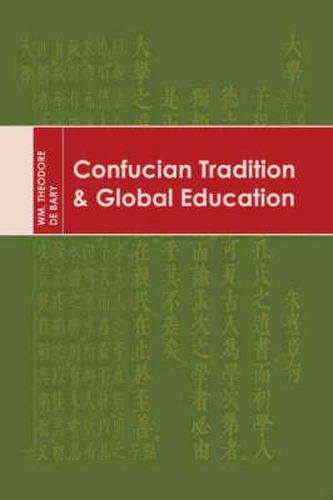Readings Newsletter
Become a Readings Member to make your shopping experience even easier.
Sign in or sign up for free!
You’re not far away from qualifying for FREE standard shipping within Australia
You’ve qualified for FREE standard shipping within Australia
The cart is loading…






Drawn from a series of lectures that Wm. Theodore de Bary delivered in honor of the Chinese philosopher Tang Junyi, Confucian Tradition and Global Education is a unique synthesis of essay and debate concerning the future of Chinese education and the potential political uses of Confucianism in the contemporary world. Rapid modernization and the rise of English as a global language increasingly threaten East Asia’s cultural diversity and long-standing Confucian traditions. De Bary argues that keeping Confucianism alive in China is not only a matter of Chinese identity, but also a critical part of achieving a multicultural global education. Scholars take different views on what is worth preserving in Confucian tradition, and whether it is possible for the classical teachings to remain relevant in today’s high-tech educational environment. De Bary and his contributors assert that the Chinese classics are the key to this survival, and therefore their inclusion in a global humanities curriculum is essential. De Bary also believes in the power of the classics to humanize the modernization process and to shape a more democratic East Asia. Kwan Tze-wan discusses the difficulty of teaching the Chinese humanities in English when certain ideas and values are best expressed in a native language, and Cheung Chan Fai demonstrates how it is still possible for Confucian humanism to contribute to a modern liberal education. Timely and passionately argued, Confucian Tradition and Global Education is a major work emphasizing the importance of Chinese philosophy in the post-World War II era.
$9.00 standard shipping within Australia
FREE standard shipping within Australia for orders over $100.00
Express & International shipping calculated at checkout
Drawn from a series of lectures that Wm. Theodore de Bary delivered in honor of the Chinese philosopher Tang Junyi, Confucian Tradition and Global Education is a unique synthesis of essay and debate concerning the future of Chinese education and the potential political uses of Confucianism in the contemporary world. Rapid modernization and the rise of English as a global language increasingly threaten East Asia’s cultural diversity and long-standing Confucian traditions. De Bary argues that keeping Confucianism alive in China is not only a matter of Chinese identity, but also a critical part of achieving a multicultural global education. Scholars take different views on what is worth preserving in Confucian tradition, and whether it is possible for the classical teachings to remain relevant in today’s high-tech educational environment. De Bary and his contributors assert that the Chinese classics are the key to this survival, and therefore their inclusion in a global humanities curriculum is essential. De Bary also believes in the power of the classics to humanize the modernization process and to shape a more democratic East Asia. Kwan Tze-wan discusses the difficulty of teaching the Chinese humanities in English when certain ideas and values are best expressed in a native language, and Cheung Chan Fai demonstrates how it is still possible for Confucian humanism to contribute to a modern liberal education. Timely and passionately argued, Confucian Tradition and Global Education is a major work emphasizing the importance of Chinese philosophy in the post-World War II era.